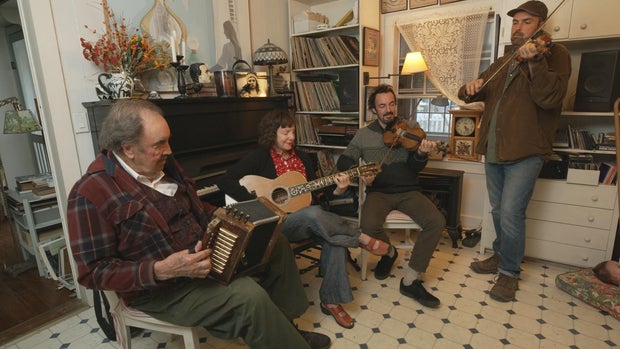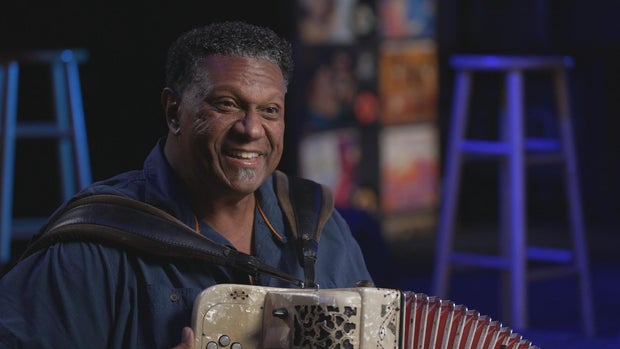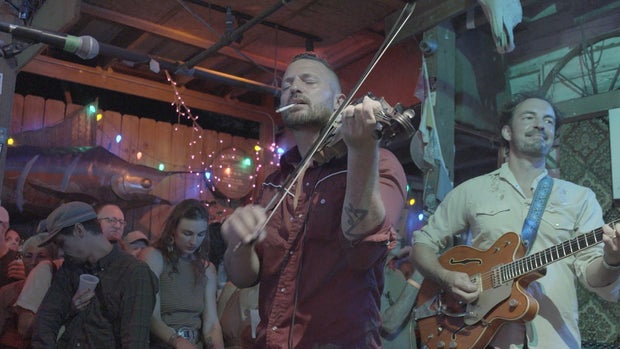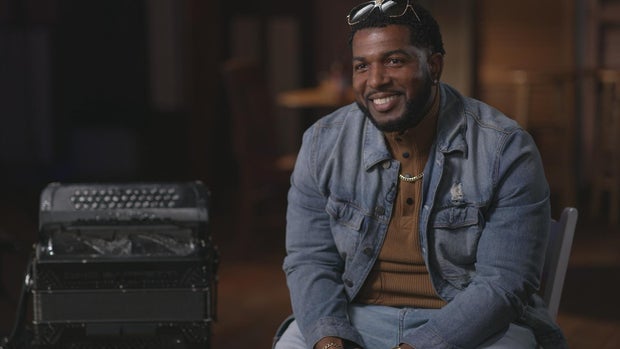Cajun and Zydeco music, the sounds of southwest Louisiana, are experiencing a remarkable revival - CBS News
The idea that this country has become one big, bland, conformist culture, the United States of generica? Well, if you're in search of a counterpoint, hang out, as we did, in the marshy interior of southern Louisiana. You need no passport to enter Cajun country, but it's an exotic land like nowhere else, home to a cuisine, a language, a landscape, even a pacing all its own. And then, there's the singular sound. Cajun music — and its cousin from across the way, Zydeco, resists easy description. But it is intoxicatingly catchy, often sung in French, and enjoying a most unlikely renaissance.
The sun is out and living is easy on the bayous of Louisiana. The fish are jumping — those are carp — and the cypress trees grow high.
On dry land, the music hangs in the humidity.
In Eunice, Louisiana, the Savoy family has lived on this patch of land for eight generations. Music is often a family inheritance down here, and you can think of the Savoys as the Von Trapp clan of Cajun country — Acadiana, as it's known.
Joel is a Grammy-winning producer and musician, often accompanied by his brother, Wilson—also a Grammy winner.
Their father Marc, an accordion-maker by day, is a prominent musician in his own right, as is their mother, Ann, who once recorded with Linda Ronstadt.
Jon Wertheim: What defines the Cajun sound?
Wilson Savoy: Typically Cajun music has a Cajun accordion, fiddle, sung in Cajun French. They play two-step and waltzes. It's got a very unique rhythm, very syncopated rhythm that you don't hear in a lot of other kinds of music. It's the syncopation that drives the music.
Ann Savoy: And it has a hauntingness about it, the music. And, it's just got soul, you know.
These sounds are sourced from the unique blend of people that converged on Cajun country over the centuries.

Joel Savoy: The music is obviously born out of this swirl of different cultures. The accordion arrived with some part of the population. Fiddle arrived with different part of the population. The syncopation comes from people that we encountered here, the African Americans, the Creoles, the Spanish, things like that.
Joel Savoy: It's also a social music. You know, anytime there's music, there's somebody hanging out, somebody cooking. These things just are part of life. It's always inclusive. Maybe you'll dance a few times. Who knows?
As we saw, when the sun sets in Acadiana, the volume turns way up.
This music is the soundtrack in dive bars, in night clubs, and the old French salles de danse — dance halls — that stud this landscape.
And while it's not topping Billboard charts, the music is experiencing a resurgence as young audiences two-step once again, to those accordions, fiddles and wash-boards.
Chubby Carrier: You say Louisiana, the first thing to come outta their mouth is, "How is New Orleans?" I'm like, "I don't know. I don't live in New Orleans." I live in southwest Louisiana.
Jon Wertheim: Totally different sound.
Chubby Carrier: A totally different sound.
Chubby Carrier is a Grammy-winning accordionist from Church Point, Louisiana. He tours with his group, The Bayou Swamp Band.
Chubby's Zydeco is a relative of Cajun music, born out of the French-speaking Black Creole community.
Chubby Carrier: One time this couple came and goes, "Honey, you gotta come see this. That's a Black gentleman with an accordion in his hand. I wonder if he plays polka, honey."
Jon Wertheim: Polka, oh. You had a surprise for 'em.
Chubby Carrier: Oh, my goodness, and I seen that, and they came back. And when I seen 'em sittin' there, I said, "Watch this."

Chubby Carrier: I started playin' my songs, and she started lookin' over to her husband going, "Wow, this is great." She starts doin' this. (taps)
Jon Wertheim: She thought she was comin' for Lawrence Welk, and she got you--
Chubby Carrier: Somethin' like that.
Jourdan Thibodeaux is the frontman of the touring band Les Rôdailleurs.
Jourdan Thibodeaux: It's just the sounds of our community And I think they're just-- buries into your heart when you-- when you're little.
Jon Wertheim: And it's not some hipster ironic thing.
Jourdan Thibodeaux: No. Most of the people that be at these kind of dances are as far removed from a hipster as you could possibly imagine.
Jourdan is Cajun music's equivalent of a rock star. And through his music, he's become something of a global ambassador for Cajun country and its way of life.
Jon Wertheim: You have a saying, you say a lot that's in some of your song lyrics. You wanna tell us what it is?
Jourdan Thibodeaux: Tu vis ta culture ou tu tues ta culture, il y a pas de milieu. Means, "You either live your culture or you kill your culture. There's no in between."
Jon Wertheim: What do you mean?
Jourdan Thibodeaux: You see this-- this vanishing of cultures, of dialects, of-- of everything to just create this one generic human, you know. And it's really sad to me. So I'm gonna get up every day and I'm gonna live my culture today. I think it's every individual's responsibility to maintain who they are as a people.
Time was, Louisiana French could be heard on every street corner, both in Cajun and Creole communities. Jourdan learned French from his grandmother. But today, the language is dwindling as the march of Americanization proceeds.
Jourdan Thibodeaux: Imagine still being home and saying, "Oh, I miss home." It's-- it's a very hard feeling to convey.
Jon Wertheim: I wonder if-- if the language is diminishing, the Cajun music becomes that much more important as this transmitter of culture--
Jourdan Thibodeaux: Oh, without a doubt. Without a doubt. there are countless kids who are learning the language just from the music.

The Cajun story starts in Nova Scotia, where this French-speaking people led a peaceful life, until they didn't. In the middle of the 1700s, the conquering British kicked out the Acadians — shortened to Cajuns. Expelled, they found an improbable home amid the backwaters of French Louisiana. From the craggy north Atlantic to the Delta and bayous of the Atchafalaya Basin, the largest swamp in North America. Jourdan gave us a tour of the land that shaped his Cajun ancestors. They adapted to survive — and then thrive — in this new and sometimes hostile environment.
Jon Wertheim: Did I hear right, you learned to swim in this water?
Jourdan Thibodeaux: Yeah, oh yeah. My mama, they would take the kids, put us in a life jacket and throw us out of the boat to go swim so they could fish in peace, you know? And she'd make the turn and she'd see an alligator. "Mama, they got an alligator." "You can see it?" "Yes ma'am." "Then it's fine. If you can't see him no more, let me know."
The Cajuns didn't come with much, but they did bring their old French melodies.
Jourdan Thibodeaux: We sing a lot fishing. When we sit and fish, me and my little girl, my youngest, she likes to sit and sing. So while we're fishing she sings to the fish to-- to get 'em to come.
Long as he brought up fish, well, there's an unwritten rule in Cajun country: you can't have the music without the food.
Joel Savoy and his family invited us into their kitchen.
Marc Savoy: We're cookin' some shrimp étouffée. Étouffée is a French word that means smothered, so we smothered 'em.
Jon Wertheim: Where-- where'd you learn? From-- from your folks--
Marc Savoy: Well, from my father, yeah. A lot of people say, "What's the recipe?" I said, "I don't know what the recipe is."
Jon Wertheim: New York, you can go into a Michelin star restaurant, and they've got étouffée and gumbo.
Marc Savoy: Yeah, but it's not the same.
Jon Wertheim: Not the same?
Marc Savoy: They don't know what they're doing.
Marc Savoy: I propose a toast to my grandmother, who lived in this house. And with her-- lack of gentility, sh-- she would always say Errête de bavarder, assieds-toi et mangeons-nous. "Wuit your babbling, sit down, and let's stuff ourself."
Jon Wertheim: Hear, hear.
Dinner guest Cheers.
Dinner guest: Cheers.
The music, the food, the drink, the bonne temps— the good times, these traditions braid all the communities here, but with slight twists.
Chubby Carrier's father and grandfather were sharecroppers who played music at night. He showed us the difference between the blues-heavy Zydeco he grew up with and the more country-infused Cajun sound.
Chubby Carrier: So I took one of my grandfather's songs (music) Now you see? (music) I did all my Zydeco. (music) That's the Zydeco sound. (music) Now watch your waltz. Take it to the Cajun. (music) You hear that? And I take that same song and I speed it up. It's gonna turn into a Zydeco song. Whoa. All in one, brother.
Though entwined musically for decades, the Black Zydeco and the White Cajun scenes couldn't mingle much in the Jim Crow deep South. We first met Chubby at La Poussiere (the dust), a dance hall in the town of Breaux Bridge. He remembers when Black bands—and patrons—weren't allowed in.
Jon Wertheim: I wonder if you thought about what your dad and your grandpa would have been thinkin' watchin' you play this venue where they wouldn't have been playin'.
Chubby Carrier: I mean, we couldn't even step in that club." Like, Daddy and my grandfather, I want to say this, they fought the fight for us, man. Daddy and granddaddy's in heaven lookin' down goin', "My son is playin' at a White venue that I never thought in a million years that I would ever, ever see." But how good it is. How sweet it is, huh?
Today the Cajun and Zydeco crowd overlap like never before.
Lil' Nate: So you got the too too pop. Too too pop. Chicha chicha chicha chicha chicha chicha chicha chicha. it feels like a train movin'. And that's why…

Like virtually all the musicians we interviewed, Lil' Nate Williams has seen a surge in popularity. Last year, his streaming audience jumped by, get this, more than 3,000%.
Jon Wertheim: How do you describe your style of zydeco? It's not traditional, is it?
Lil' Nate: Very much not traditional, man. It's a fusion. That's-- that's how I think of it. Keyboards. Synthesizers. A lotta R&B. A lotta R&B--
Nate learned to play from his father, also a renowned Zydeco musician. And, he's found, pushing musical boundaries is not always frictionless.
Jon Wertheim: What's Dad say about this?
Lil' Nate: My dad has always been encouraging. But I could see his face sometimes. You know? We'll sit out in the studio And he'll look at me and-- listenin' to my stuff. "Can we put some more accordion in there? Can-- can we put some more French in there? Can we put this in there?" But at the end of the day, you know, we come to some compromise in understanding that this is-- you, this is me.
And the music has struck a chord beyond Louisiana. Jourdan's band tours across the country and internationally.
We met Jourdan, Joel and Wilson after they'd played a packed show in the Red Hook neighborhood of Brooklyn of all places.
The band—like us—ponders what, precisely, is fueling this interest outside Louisiana.
Jon Wertheim: They don't speak French, they're not gettin' the lyrics, what are they connecting to--
Joel Savoy: I wonder that --all the time.
Jourdan Thibodeaux: I really just believe it's the emotion. If we playin' and I'm happy and we cuttin' up and you can see and feel that good time, you're gonna feel that good time. Same thing, if the song's horribly sad, maybe it makes you feel a little sadness inside of you And you connect on that emotional level.
Emotional connection to a sound that — like the accordion itself — can contract and expand, old melodies in a new era.
Jourdan Thibodeaux: True music, it's emotive. You're gonna feel it. And that's--
Wilson Savoy: Sure.
Jourdan Thibodeaux: Everybody wants to feel somethin'
Produced by David M. Levine. Associate producer, Elizabeth Germino. Edited by Warren Lustig.
L. Jon Wertheim is an accomplished journalist and 60 Minutes correspondent.












